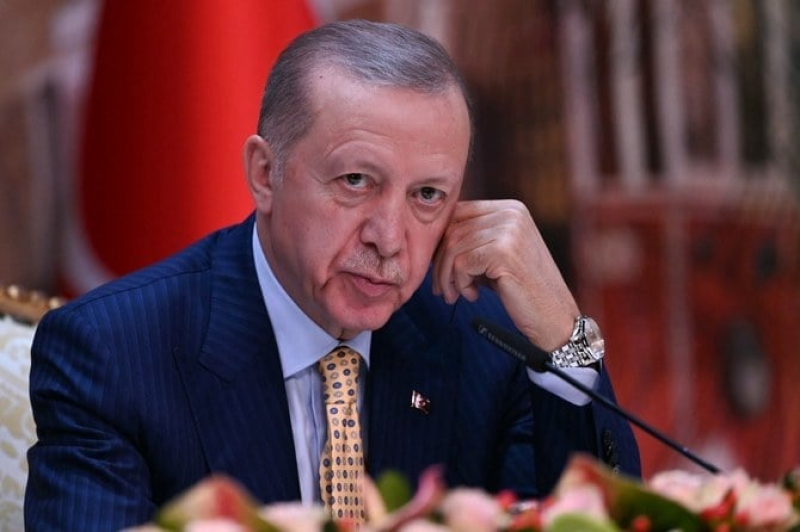- EC Issues Gazette for 297 Newly Elected MPs |
- 9-year-old boy beaten to death over betel nut theft in M’singh |
- BNP fast-tracks cabinet plans after resounding victory |
- Modi Calls Tarique, Pledges India’s Support |
Erdogan in Iraq to talk security, water and oil

Turkish President Recep Tayyip Erdoganwas in neighbouring Iraq on Monday for his first state visit there in years,with water, oil and regional security issues topping their agenda.
Erdogan was greeted with a 21-gun salute at Baghdad's international airportby Prime Minister Mohamed Shia al-Sudani and later met Iraqi President AbdelLatif Rashid.
Erdogan last visited Iraq in 2011. His trip comes as regional tensionsspiral, fuelled by the Israel-Hamas war in the Gaza Strip and tit-for-tatattacks between Israel and Iran, reports BSS.
He told Rashid that Turkey "had expectations of Iraq regarding the fightagainst the terrorist organisation PKK, and that Iraq must be rid of all formsof terrorism", Erdogan's office said.
The PKK (Kurdistan Workers Party), which has fought a decades-longinsurgency against the Turkish state and is considered a "terrorist" group byAnkara and its Western allies, has a presence in northern Iraq, as doesTurkey's military.
Both Erdogan and Sudani on Monday stuck to their countries' positions oncontentious issues, while also highlighting the economic opportunities raisedby the visit.
"We discussed joint measures that can be taken against the PKK and itsallies which target Turkish territory from inside Iraq," Erdogan said in anappearance with Sudani.
"I shared with my counterparts my firm conviction that the PKK presence inIraq will end as soon as possible, with it being declared a terroristorganisation," he said.
- Presence of 'armed elements' -
For decades, Turkey has operated from several dozen military bases innorthern Iraq against the PKK.
Its military operations, which sometimes take place deep into Iraqiterritory, have regularly strained bilateral ties, while Ankara has sought outincreased cooperation from Baghdad in its fight against the PKK.
Sudani on Monday spoke of "bilateral security coordination" that would meetthe needs of both Iraq and Turkey.
He said this would "make it possible to face the challenges posed by thepresence of armed elements".
However, in a televised interview in March, Iraqi Defence Minister Thabetal-Abbasi ruled out "joint military operations" between Baghdad and Ankara.
He said they would establish a "coordination intelligence centre at theappropriate time and place".
Apart from security another major contentious point is water, and sharingof the precious resource.
Baghdad has been highly critical of Turkish upstream dams on their sharedTigris and Euphrates rivers, saying the reduced flow has worsened waterscarcity in Iraq.
Erdogan said the water issue would be "one of the most important points" ofhis visit following "requests" made by Iraq.
"We will make an effort to resolve them. That is also their wish," he said.
- Water 'framework agreement' -
On Monday, both countries signed a 10-year "framework agreement" on water.
Sudani said he hoped this would mean "joint and equitable management ofwater resources" from the two rivers. "It is in no one's interest for thesituation to worsen regarding water and Iraq's quota," Sudani said.
Erdogan said that both Turkey and Iraq were "negatively affected by theclimate crisis".
"The efficient use of water and avoiding waste is as important as theamount of water," he said.
Also on Monday's agenda was the "Route of Development" project.
This is a road and rail corridor that would stretch 1,200 kilometres (745miles), aiming by 2030 to link the Gulf with Turkey via Iraq.
In the presence of Erdogan and Sudani on Monday, four ministersrepresenting Iraq, Turkey, the United Arab Emirates and Qatar signed amemorandum of understanding on the $17-billion project, an Iraqi statement said.
It said the project "aims to stimulate economic growth and enhance regionaland international cooperation through economic integration".
During his trip, Erdogan is also scheduled to meet officials in Arbil, thecapital of northern Iraq's autonomous Kurdistan Region.
- Lost oil revenues -
Iraqi oil exports are another point of tension between the two countries,with a major pipeline shut for more than a year over legal disputes andtechnical issues.
Oil exports were previously independently sold by the Kurdistan region,without the approval or oversight of the central administration in Baghdad,through the Turkish port of Ceyhan.
The halted oil sales represent more than $14 billion in lost revenues forIraq, according to an estimate by the Association of the Petroleum Industry ofKurdistan which represents international oil companies operating in the region.
In the first quarter of 2024, Iraq was Turkey's fifth-largest importer ofproducts, buying food, chemicals, metals and other products.

